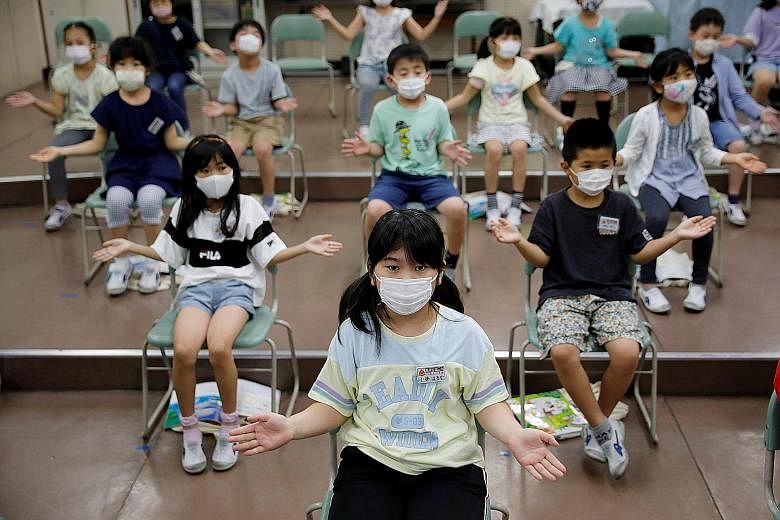Asia's coronavirus resurgence is sending chills across the region.
Countries earlier hailed for containing the virus have been hit by a spate of new cases setting daily records, and some that had yet to bring their initial outbreaks under control are returning to lockdown as numbers spike.
For many, hopes for a quick return to some form of normalcy are fast fading. And in its place is a growing fear that newly reopened businesses may have to shut once more, and that plans to resume cross-border travel may be put on ice.
"I had hoped to be able to travel to Taiwan, Macau or mainland China again soon, but now my hopes are likely dashed," said Hong Kong resident Wan Shan, who works in the financial service sector in the city, which is seeing its coronavirus success story unravel rapidly.
Hong Kong reported another new daily record of Covid-19 infections yesterday with 67 cases, all but four locally transmitted.
The Asian financial hub had returned to normal life for several weeks after multiple days of zero new infections, but a sudden resurgence of the deadly disease has forced the authorities to reintroduce strict social distancing rules this week, shutting public facilities and limiting large gatherings again.
WORRYING UPTICKS
"We see that there will be this occasional recurrence of spread, and that is where repeated closures will be necessary," said Professor Teo Yik Ying, dean of the National University of Singapore's Saw Swee Hock School of Public Health, referring to the resurgences in places like Hong Kong, Japan and Australia. "This really reminds us that there is an outbreak out there."
Japan recorded 610 new Covid-19 infections yesterday, crossing the 500 threshold for the first time since mid-April. Tokyo reported a daily high of 286 new cases.
The uptick has complicated a multibillion-dollar plan to boost domestic tourism, with the government tweaking the campaign to exclude Tokyo residents and trips to and from the capital.
The situation is similar in Australia, which brought its second-most populous state of Victoria back under lockdown last week after several new clusters emerged. Victoria also marked a daily record of 317 new cases yesterday. Many Australian states have reintroduced internal border closures.
"What will be crucial (to countries resuming travel) is whether those that have chosen to reopen their tourism sector can do so safely," said Associate Professor Walter Theseira, an economist from the Singapore University of Social Sciences, adding that Thailand, Indonesia's Bali Island, Spain and Greece will be closely watched.
"It is going to be a bellwether for how quickly we can do it."
The prospects do not seem promising, especially as the pandemic is still raging elsewhere in the region.
NEW VIRUS EPICENTRE?
The Red Cross has warned that South Asia is on track to becoming the world's next virus epicentre.
"While the world's attention has been focused on the unfolding crisis in the United States and South America, a concurrent human tragedy is fast emerging in South Asia," the organisation said in an Agence France-Presse report yesterday. "Covid-19 is spreading at an alarming rate in South Asia, home to a quarter of humanity."
India, Pakistan and Bangladesh have together recorded more than 1.4 million infections and nearly 33,000 deaths.
India - Asia's worst-hit nation with a caseload set to hit one million by the end of the week - has sent hundreds of millions of people back into a sweeping lockdown. It shut down the states of Patna, Bihar and Goa yesterday. IT hub Bangalore also came under lockdown this week.
In one particularly telling example of how the outbreaks are alarming governments, Karnataka Health Minister B. Sriramulu was reported uttering "only God can save us" on Wednesday as he surveyed the burgeoning number of infections in his state.
In the Philippines, infections have more than tripled to over 61,000 since June. The authorities could put Metropolitan Manila's 12 million people back under lockdown by the end of the month.
Indonesia, with over 81,000 Covid-19 cases, has also seen daily infections in its capital Jakarta hit new records over the past week. President Joko Widodo is planning a new law to fine violators of social distancing rules.
TRAVEL RISKS
Even in Thailand, which has gone more than 50 days without a local case, two new imported infections with exposure to hundreds of people have led the government this week to halt quarantine exemptions given to some foreigners.
Such lapses in international travel processes may serve as a warning to countries considering reopening their borders.
But eliminating travel altogether is not a good option, according to NUS' Prof Teo.
One better way to mitigate the risks would be to find out how best to identify travellers who are more likely to enter the country infected, such as through pre-travel testing and extra tests on arrival, he said.
"It is a delicate balancing act," said Associate Professor Alex Cook, vice-dean of research at the NUS Saw Swee Hock School of Public Health. "Globally, we are all trying to get to the sweet spot where neither the economy nor our health is too badly affected."
• Additional reporting by Clara Chong, Toh Ting Wei, Walter Sim and Raul Dancel


